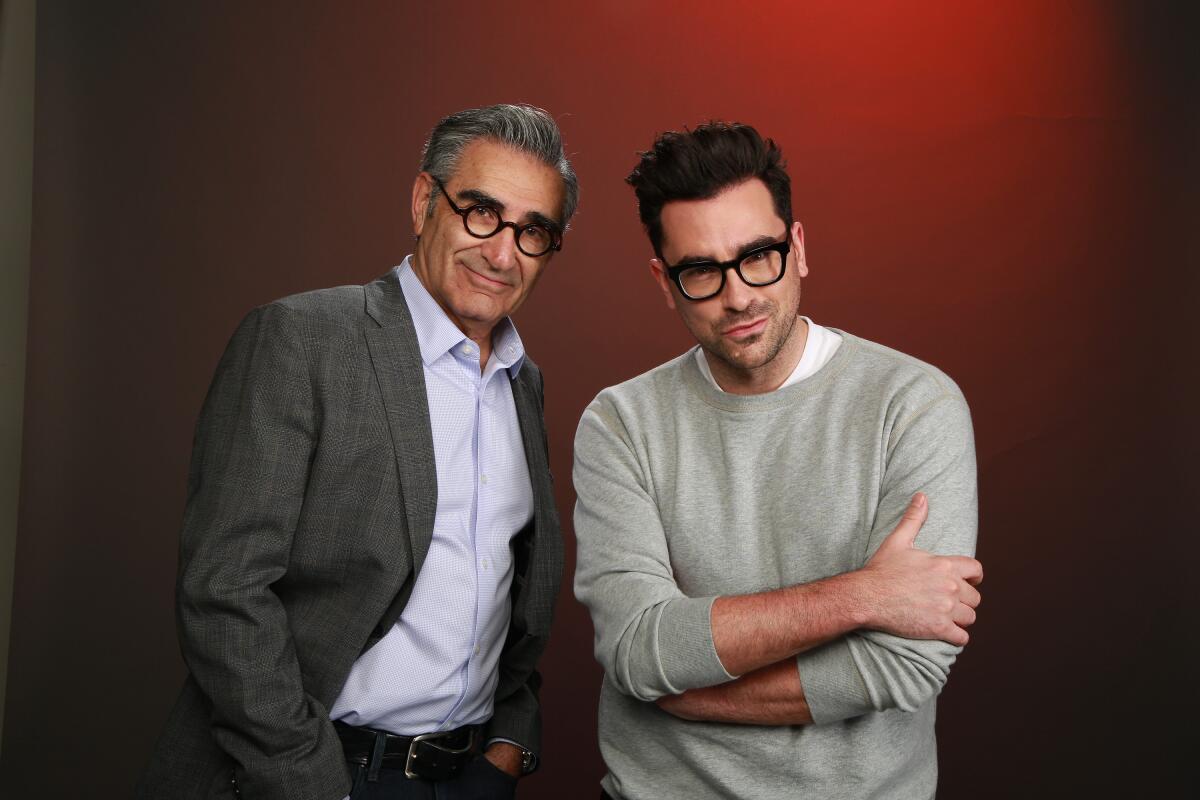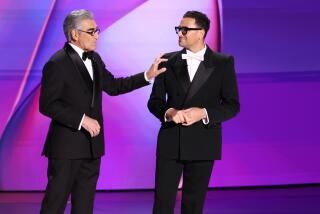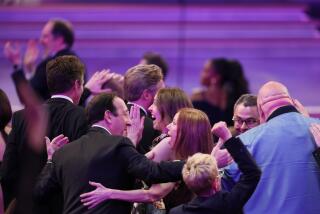Eugene Levy and his son Dan find ‘Schitt’s Creek’ is not such a bad place to be

- Share via
In “Schitt’s Creek,” a wealthy family loses everything and is forced to relocate to a small, oddly named town it once bought as a joke. Johnny Rose, played by Eugene Levy, is the patriarch. His wife, Moira, a former soap star, is played by Catherine O’Hara. The grown children, Alexis and David, are played by Annie Murphy and Daniel Levy.
Daniel co-created the comedy with Eugene, his father, and is showrunner.
Now in its fifth and penultimate season, but only recently discovered in the U.S. due to its appearance on Netflix, the show boasts Emmy nominations for comedy series, costumes and for Eugene Levy‘s and O’Hara’s lead acting.
The Levys dropped by The Envelope video studio recently to discuss the series. Here’s some of what they had to say.
We’re so used to the characters you play, say, in the Christopher Guest movies — I like seeing Johnny take charge.
Eugene Levy: Johnny is the, I would say the straight central figure in the show. And, you know, it’s true, I’ve spent a career playing the funny characters that kind of come in and be funny for a few scenes, and that’s pretty much it. I was excited about doing this ... because I really have not done that before in any great capacity.
[Johnny’s] executive skills had to kind of seep into his personal life as well, in terms of what do you do to handle a crisis? This crisis of losing everything and having to move your family to a small-town motel. You know, somebody has to keep it together.
Daniel Levy: We made a very conscious choice to not have the Rose family be criminals. They didn’t lose their money because they were swindling money from other people, or it was like tax evasion or anything. They lost their money because they had a business manager who ran away with it. They didn’t do anything to deserve it. They might have lived a little too luxuriously for too long and now find themselves incapable of buying groceries.
You’ve won 11 Canadian Screen Awards, something like that?
Eugene Levy: Yeah, we’ve won a few CSAs, yes, absolutely.
I think you guys set a kind of record, when the two of you were nominated in the same category? The first time a father and son were nominated as best actor at the same time.
Eugene Levy: It’s the first time in the history of the entertainment business that a father-son have been nominated for the same category in the same show.
That’s pretty cool.
Eugene Levy: Yeah, it is, it is. It’s an awkward feeling for me.
Daniel Levy: I’m not awkward about it at all. I go into it just expecting to lose.
Eugene Levy: I actually won. I’m supposed to be the straight man and I’m winning comedy actor, so I’m doing something definitely wrong.

Pretty much every time Catherine O’Hara speaks [as Moira] is funny, that very unique diction and register she uses. You’ve worked with her for so long — does she still make you laugh?
Eugene Levy: Yes, but it’s not like working with [costar] Chris Elliott, who can get you a million kind of different ways. Catherine, like me, really, we’re character actors. We get our laughs through character, and there are some very, very funny moments that she has as Moira, and as Catherine she can nail you with a line, too, that just comes out of nowhere. Catherine is so chameleon-like when she gets into a character, you cannot see any seams. And this character, Moira, that she has created is one of the most iconic, I think, characters of any television comedy that’s ever been on the air.
Talking about how accepting the town is, I have wondered if this show had been made in the United States, if maybe it would’ve had a bit nastier edge to it.
Daniel Levy: I actually think it’s why people in America are watching the show. It’s a cloudy time, and it’s a thunderous time, and it’s a rainy time for all of us. And I think there’s a rise of well-intentioned television, and I think there’s a reason why a lot of our success came after the election. I have to correlate the fact that there is unrest in the country, and if you can provide a safe space where people can turn for entertainment ... where people can sort of sit down in front of their television screens and see a gentler world than the one they’re living in, that people will naturally gravitate toward that.
More to Read
Sign up for The Envelope
Get exclusive awards season news, in-depth interviews and columnist Glenn Whipp’s must-read analysis straight to your inbox.
You may occasionally receive promotional content from the Los Angeles Times.







